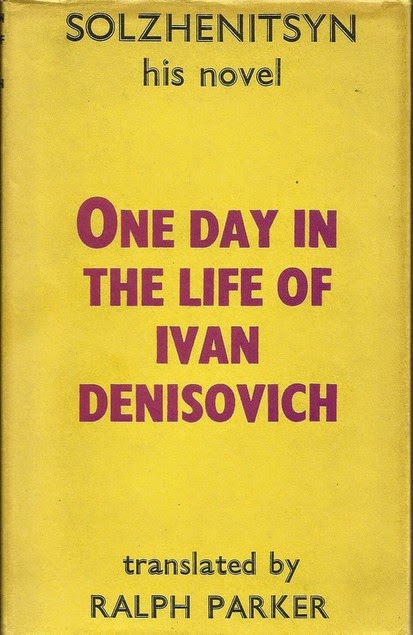Inspiring Older Readers
 posted on 14 Nov 2016
posted on 14 Nov 2016
One Day In The Life Of Ivan Denisovich by Alexander Solzhenitsyn (trans. Ralph Parker)
There can be few first novels that have caused a bigger literary and political sensation that One Day In The Life Of Ivan Denisovich when it was published in 1962. At this point in his life Solzhenitsyn was an unknown physics and maths teacher who, during Stalin’s reign of terror, had spent time in a prison camp in Kazakhstan for reputedly having made statements derogatory to the head of state. He was released in 1953 after eight years of imprisonment and he found himself a free man just as Stalin died and power passed to Nikita Khrushchev, who quickly engaged in a political campaign to liberalise the Soviet Union and to denounce the Stalin years. Solzhenitsyn’s ‘crime’ was quashed and he became one of the so-called ‘rehabilitated’ and free to take up his teaching role and to focus on his writing.
One Day was subsequently published simultaneously in the influential Soviet magazine, Novy Mir, and in the West - in the UK it was released by Gollancz in a translation undertaken by Ralph Parker. Solzhenitsyn’s detailed description of a typical day in the life of a prisoner in the now infamous GULAG system of imprisonment and punishment suited the new Khrushchev regime very well and probably did more to help expose the nature of Stalin’s dictatorship than any number of political speeches would have done.
The book is a fiction but one which is heavily informed by Solzhenitsyn’s own personal experiences – Ivan Denisovich Shukhov isn’t just the author in disguise but he clearly shares many of his characteristics. For Ivan Denisovich the day in question starts at 5.00 am and we see how each hour progresses exclusively through his eyes and we share his moods, physical discomforts and small victories against the system; we see his fellow prisoners and the guards; and we come to understand the nuances of the way the administration and the pecking order established by the prisoners actually works.
But most of all we see first-hand what survival means in a dehumanised system that freezes and starves men and keeps them in order by setting them in a bizarre combination of competition and dependency in order to ensure their survival. This is a world of small margins where an extra bowl of watery fish soup or half an hour in a warm room can make the difference between a good and a bad day.
And we see this world through the eyes of Ivan Denisovich – eight years into his sentence, experienced, respected but not a big fish in the pool. He gets along by being dependable and by being respectful. He knows his place, he knows his own strengths and he’s learned enough to stay out of trouble but seize his opportunities. In this world of cold and pain there is no dignity but Ivan Denisovich comes about as close to it as its possible to get.
The honesty and authenticity of Solzhenitsyn’s account shines through the crushing awfulness of the situation and in this respect it feels very much like the forerunner of other great accounts of imprisonment and survival against the odds that I have read – J.G. Ballard’s Empire of the Sun, Brian Keenan’s An Evil Cradling or Manuel Puig’s Kiss of the Spiderwoman. Inevitably Ivan isn’t likeable – none of the prisoners are nor could they be – but, through Solzhenitsyn’s skill as a writer, we are able to understand and even to empathise with him as he chisels his way through the day.
We are shown here a group of men who are, the author seems to be telling us, fundamentally ordinary, decent people caught up in a bogus penal system that has no pity on them. These are men who are generally happiest when they are working and doing something useful, men you would be happy to socialise with in any other situation. Their status as ‘criminal’ is a brutal act of political power and the consequence of a State that has lost its moral compass.
This isn’t a long book, just under 200 pages, and it’s beautifully simple and clear – I have no idea whether this is thought of as a fair and accurate translation but, for me, Ralph Parker has produced something that has a fabulous rhythm to it and keeps you turning each page with a sort of dreadful anticipation.
I’m not someone who flourishes in the cold and Solzhenitsyn’s ability to make you feel physically frozen is unnerving. This ability to draw you into his world and to make you feel it as well as understand it is a characteristic of his later work too – I clearly remember reading his much longer, even bleaker book, Cancer Ward and being convinced by the time I’d finished it that I had some obscure cancer of the shin bone.
As it turned out, Khrushchev’s time in power was a very short one and the window he opened was quickly slammed shut. As a result, life in the Soviet Union became very difficult for Solzhenitsyn as a writer and his now well documented struggles with the authorities came to a head when he was awarded the Nobel Prize for literature and willingly or unwillingly became something of a pawn in the Cold War propaganda game being played out between the Soviet Union and the West. One Day In The Life of Ivan Denisovich just happened to be the right book at the right time for both the author and the State and the rest of us were the beneficiaries of those political tectonic plates smashing together. It’s a book I’ve read several times now but I find something new every time - I’m already looking forward to the next reading.
Terry Potter
November 2016